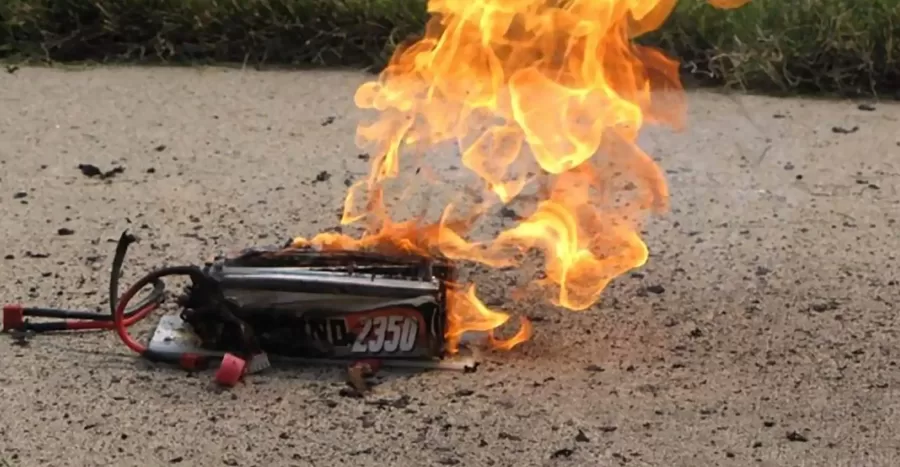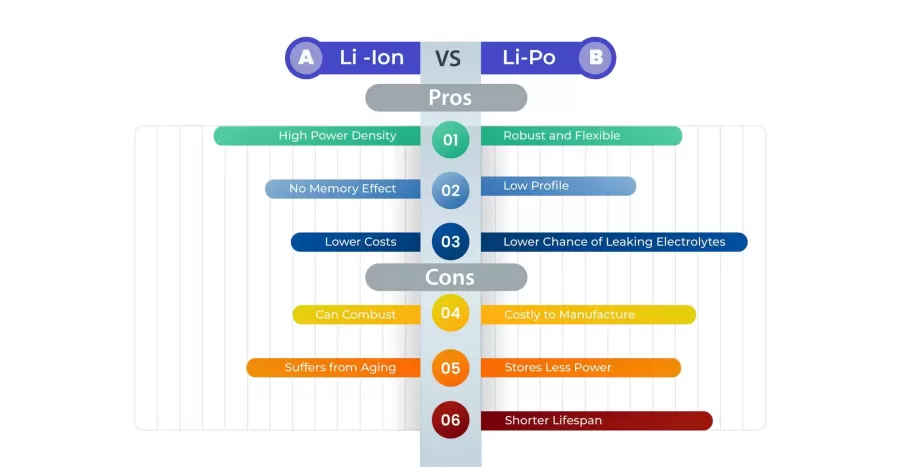Power supply makes a difference in our lives. There are two popular types in the market – Lithium Polymer (Li-Po) and Lithium Ion (Li-Ion). Both of these batteries offer significant advantages, making them the preferred choice for a variety of applications. However, there are some key differences. These differences will influence your decision in choosing the compatible battery for your needs. As a professional custom battery pack manufacturer, I will explain the topic of lithium polymer vs lithium-ion.
Lithium-polymer VS Lithium-ion Which is Safer?
Safety is an important factor to consider when choosing a battery. Lithium polymer and lithium-ion batteries are generally safe to use, but there are some differences. Lithium polymer batteries are safer as they are more stable and have small risks of leakage or explosion. On the other hand, lithium-ion batteries have a higher risk of thermal runaway, which can occur under extreme conditions or misuse.
However, both types of batteries are safe, as long as you design your battery pack solution which is compatible with your needs and customized battery management system. If your application is looking for a higher working voltage, please choose lithium polymer battery.
The overcharge, over-discharge, over-temperature protection, and internal short circuits are associated with the usage of lithium-polymer batteries and lithium-ion batteries. Crushing or nail penetration of lithium polymer batteries can result in catastrophic failures such as electrolyte leakage and fire.
You should consult a professional battery pack manufacturer to get advice on lithium polymer batteries or lithium-ion batteries for your application.

Li-polymer Battery VS Lithium-ion Battery Which is Best?
Which type of battery is best depends on your specific requirements as well as the application. Lithium polymer batteries are known for their flexibility and slim dimension, making them suitable for thin and light devices such as drones and GPS Trackers. On the other hand, Li-ion batteries offer a good balance between energy density and other factors, making them an excellent choice for devices that require longer battery life, such as energy storage systems and electric vehicles. Therefore, which one is the best which depends on your specific needs?
What is the Difference between Lithium and LiPo Battery?
People would like to know the exact difference between lithium batteries and lithium-ion batteries. They are both a type of rechargeable lithium-ion battery, but in fact, lithium polymer batteries are a specific sub-type of lithium-ion batteries that offer some unique advantages in terms of safety and design flexibility.
The following table details: lithium polymer battery vs lithium-ion battery:
| Feature | Lithium-ion (Li-ion) | Lithium Polymer (LiPo) |
| Electrolyte | Liquid | Solid-state, gel-like, or polymer |
| Structure | Rigid, rectangular | Can be molded into various shapes |
| Safety | Less safe due to potential for leakage and thermal runaway | Less safe due to the potential for leakage and thermal runaway |
| Energy Density | Lower | Higher |
| Cycle Life | Longer | Shorter |
| Cost | Less expensive | More expensive |
| Less safe due to the potential for leakage and thermal runaway | Self-discharge | 1-2% per month |
| Typical Applications | Electric vehicles, Medical, UPS System | Drones, RC vehicles, portable electronics |

How Long Does Lithium Polymer Battery Last?
A lithium polymer (LiPo) battery’s lifespan is determined by a variety of factors, including how to use it, how to store it, and how to charge it. On average, LiPo batteries have a charge cycle life of 300 to 500 times.
Here are some of the reasons that might shorten the life of a LiPo battery:
- Cycles: A LiPo battery is charged and discharged frequently which causes the cycles shorter. The charge and discharge bring stress to the battery’s cells, causing them to degenerate.
- Storage conditions: LiPo batteries are stored in a cool, dry environment. High temperatures and humidity reduce the lifespan of a LiPo battery.
- Overcharge: When a lipo battery overcharges, it reduces its lifespan. Please use a dedicated charger.
- Depth of discharge (DOD): The depth of discharge is the amount of a battery’s capacity before it is recharged. Deeper DODs can reduce the longevity of a LiPo battery.
Lithium-ion Polymer VS lithium-ion: Which has a Higher C Rate?
The “C rate” of a battery refers to its ability to discharge and charge fast. It is stated as a multiple of the capacity of the battery. A 1C rate, for example, indicates that the battery may be charged or discharged at a rate of one times its capacity. A 2C rate indicates that the battery may be charged or discharged at twice its capacity rate, and so on.
On the one hand, Cylindrical and square Li-ion batteries make it difficult to dissipate heat, and high-rate charge and discharge can cause thermal runaway. Thinner lithium polymer batteries can quickly dissipate internal heat. On the other hand, Li-Po batteries have lower internal resistance(A=V/Ω), which means they have a larger discharge current.
Therefore, lithium polymer batteries have a greater C rate than lithium-ion batteries. Because of the low internal resistance, lipo batteries become very active, they are more easily damaged due to overcharge or over-discharge. It is critical to use a dedicated charger for LiPo batteries to prevent discharge of the battery to 0%.
Do Lithium-ion or Polymer Batteries Charge Faster?
LiPo batteries typically have a lower internal impedance than lithium batteries, which means they can handle higher charging currents. In theory, lipo batteries can be charged at a faster rate.
If you want to charge faster, choose a Li-Ion or Li-Polymer battery with a higher charge C-rate. For example, a lithium-ion battery with a 1C charge C-rate will take one hour to fully charge, while a lithium-ion battery with a 2C charge C-rate will take only 30 minutes to fully charge.
In conclusion, both lithium polymer and lithium-ion batteries have their unique benefits and characteristics. While lithium polymer batteries offer better safety and design flexibility, lithium-ion batteries are superior in terms of energy density. Therefore, carefully evaluate your requirements and consider factors such as device compatibility, battery life, and charging speed. By doing so, you will be able to make the best decision and enjoy the best performance from your battery-powered device.
CMB is a one-stop shop for companies looking for custom battery pack to power their equipment, click here to get professional guidance from the CMB engineering team.


